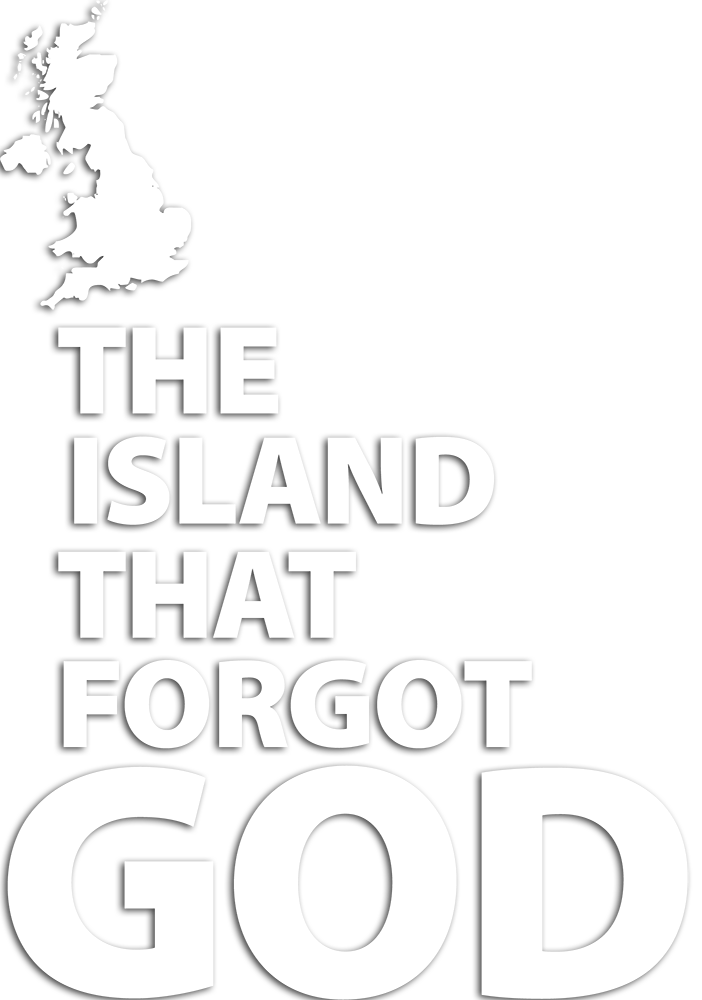 The Island That Forgot God
The Island That Forgot God
Secularization has rapidly eroded Christian beliefs in Great Britain. How did it happen, and what does it mean for the future?
“We don’t do God,” the communications director for Tony Blair famously interrupted when the British prime minister was asked about faith during an interview.
Those four curt words highlight the bigger issue of the crumbling and rotting nature of biblical faith in Great Britain, the island that includes England, Scotland and Wales. They show how Christianity in the land that produced the King James Bible, which opened God’s revelation to the common man, is now considered an awkward and rather embarrassing part of Great Britain’s history rather than its present or future.
Plunging poll numbers
Secularization—the process of separating from a spiritual connection, orientation or influence and moving to attitudes and actions not bound by religious rules—has affected the entire Western world. And it has had a particularly corrosive effect in Britain. While the massive cathedrals and churches long ago became museums of a bygone era, empty of all but tourists, the results of the 2011 census in England and several recent opinion polls reflect the velocity of change.
Campaign creator Ariane Sherine and Richard Dawkins at the Atheist Bus Campaign launch.
The results of the 2011 census showed that religion has declined far more sharply than expected over the past decade in Britain, with fewer than three in five (59 percent) describing themselves as Christian—a drop from 72 percent in just 10 years.
More than a quarter of the population now identifies with no religion, 10 percentage points higher than in the 2001 census. The overall number of people identifying themselves as Christians plunged by 4.1 million, and only a third of these attend church outside of weddings, baptisms and funerals. Younger people, young men in particular, seem to be rejecting religion altogether, as 32 percent say they do not have a religion.
More recently, a 2013 YouGov poll of 18- to 24-year-olds reported:
- 41 percent showed hostility to religion by stating that religion was “more often the cause of evil in the world,” while only 14 percent said it was a cause for good.
- When asked if they believe in God, only 25 percent stated they do, while 19 percent believe in some “spiritual greater power” and 38 percent do not believe in any sort of God or spiritual power.
- When young adults were asked which figures have influence on their lives, religious leaders came out on the bottom: only 12 percent felt influenced by them, which was significantly below politicians (38 percent), brands (32 percent) or celebrities (21 percent).
How did this happen?
How has Britain’s core, Christianity-infused culture and moral identity, built over centuries, spiraled down and imploded so rapidly? What led to this secularization and the relegation of Christian beliefs to the fringe of social significance? More importantly, where will Britain end up as a result of this demise?
The secular seeds for Britain’s—and much of the Western world’s—Christian disbelief were planted long ago. The Industrial Revolution of the 18th century had profound effects by dislodging people from agricultural settings to cities and suburbs where belief failed to take deep root. Theories from Sigmund Freud and Charles Darwin worked to banish God from the mind and universe. The horrors of two world wars shook moral and theological beliefs.
These influences were just a preamble, however, to the massive shift. According to religious and cultural historian Callum Brown in his book The Death of Christian Britain, that happened with a catastrophic and abrupt cultural revolution in a single generation that flowered between 1960 and 1975. “Secularisation,” he argues, “is to be located, in part at least, in the changing conditions which allowed previously regarded Christian and social ‘sins’ to be regarded as acceptable and moral, at least by many, in British society in 2000” (2001, p. 8).
In essence, the religious leaders went with the prevailing wind and preached a message that required little—and expected even less—of adherents. The dwindling audience grew tired of a vapid and valueless form of religion and decided to stay home.
The hinge decade of the 1960s saw the rise of radical feminism and the casting off of restraint, with cohabitation, divorce, pornography, abortion and homosexuality swirling within a sexual revolution that overwhelmed a spiritually unprepared people. Former Archbishop Carey noted how the church has merely reflected rather than shaped societal norms when he said, “Britain’s unthinking secularism is the context for the Church’s attitudes, shapeless form and its lack of any underpinning values” (quoted by Melanie Phillips, The World Turned Upside Down, 2010, p. 355).
In essence, the religious leaders went with the prevailing wind and preached a message that required little—and expected even less—of adherents. The dwindling audience grew tired of a vapid and valueless form of religion and decided to stay home.
“The Church of England,” as Jeremy Paxman, author of The English: A Portrait of a People describes it, “is the maddening institution it is because that is how the English like their religion—pragmatic, comfortable and unobtrusive … a comforter of the comfortable” (1999, p. 99).
Dereliction of duty
Callum Brown notes the dereliction of duty from Christian leaders: “Christian churches have not only fallen in size but also in moral standing. They were once a safe and unmoveable fixture at the heart of national standards, but now confidence in the probity of church leaders is almost weekly challenged by scandal” (The Death of Christian Britain, p. 4).
This began with the liberal theological colleges losing faith in the Scriptures and then indoctrinating future bishops to replace ancient ideas of sin and atonement with an inclination toward liberal psychology.
In his book The Abolition of Britain, author Peter Hitchens observes that in church teachings “the Old Testament and the Psalms, with their harsher and more uncompromising approach were relegated or eliminated.” He also points out that the 10 Commandments were disappearing from church services, “but lengthy pleas about the most fashionable international crisis would be inserted” (p. 122).
British religious leaders then shifted from a doubting and confused stance to a militantly secular one. Dating back to the 1930s, William Temple, who later became archbishop of Canterbury, said, “There is no such thing as revealed truth.” Later, the Anglican bishop of Durham, David Jenkins, spoke of the resurrection as being a “conjuring trick with bones” and received a standing ovation from a group of bishops when he called the God of the Bible a “cultic idol.”
Richard Harries, the Anglican bishop of Oxford, in 2002 took blasphemy to another level when he said that Christians should pray to “God the Mother” (The Times [London], Nov. 3, 2002). In 2005 and 2008 the Church of England issued apologies to the developing world for the spread of Christianity (The Times, Nov. 1, 2005) and to Charles Darwin for not accepting his theory of evolution (The Telegraph, Sept. 13, 2008).
In 2013 the Church of England eliminated its ban on gay clergy in civil partnerships and unofficially began to bless gay marriages in church. Having previously voted to allow females to serve as priests, the Church of England recently voted overwhelmingly to admit women to the rank of bishop (Newsweek, July 15, 2014).
Church without children
As the British people grew accustomed to this meaningless and irrelevant stew of religion, there appeared to be no good reason to believe or practice any type of Christianity, so they simply abandoned the faith. The 2008 humanist advertising campaign, splashed across buses throughout the country, appears to have resonated. It said: “There’s probably no God. Now stop worrying and enjoy your life.”
Children have become a rarity in churches today, as only 35 percent of children in Britain have been brought up in a church (2012 YouGov poll). This contrasts with the 80 percent of people aged 66 or older who had a religious upbringing. Having never attended as children, many British young adults drift to a vague agnosticism with little hostility but much indifference. They “believe but don’t belong” to a formal church and casually follow a soft and fuzzy “spirituality” of beliefs often initiated by popular culture and celebrity hedonists mixing a New Age brew of ecology, paganism, gothic romanticism and Wicca.
When asked what inspired them in a 2003 Ipsos MORI poll, more Britons said “being with friends” (46 percent), “a walk in the country” (41 percent), and music or poetry (27 percent) than said Jesus (24 percent) or a sacred text (6 percent).
Imprisoned by passing pleasures
With the Bible no longer relevant to many, Britain no longer speaks the same cultural or moral language of the nation’s past. Nor are many even familiar with the biblical narrative.
As Peter Hitchens goes on to say: “Our British Protestant sexual morality, which once required marriage as the price of pleasure, now treats any sexual activity as recreation. This allegedly liberates women from the slavery of the home, and men from the slavery of supporting a family. But in truth it imprisons children in a world where they always come in second to adult pleasures, it imprisons women in endless competition with their sisters for fun—a competition in which the rich and beautiful are the only winners as long as their wealth and beauty last and not for a moment longer—and it imprisons men in an ultimately sterile quest for passing pleasure” (The Abolition of Britain, p. 298).
Where does this religious vacuum in Britain lead? The fallout from this plunge into spiritual illiteracy and moral relativism has already had devastating societal effects:
- Britain has the third highest rate of teenage sexual activity in the world (Daily Mail, April 24, 2012).
- Nearly half (47.5 percent) of all children born in Britain are to unwed mothers (The Telegraph, July 10, 2013), and in the EU only Latvia has a higher percentage of single-parent homes (The Telegraph, Jan. 17, 2014).
- The highest rate of divorce in the EU is found in Britain (Daily Mail, July 21, 2014).
- The United Kingdom was named Europe’s “addictions capital” with some of the highest rates of alcohol and prescription drug abuse (BBC News, Sept. 1, 2013).
Heed God’s warnings!
Sadly, the people of Britain (and many other nations, such as the United States, Canada and Australia) have failed to heed God’s warnings. These include the warnings given to their physical and spiritual forefathers, the children of Israel, who were told there would be a severe penalty for forgetting God during times of affluence (Deuteronomy 8:11-20). (For more on the identity of Britain in Bible prophecy, see the LifeHopeandTruth.com article “Who Are the United States and Britain in Prophecy?”)
They have foolishly followed the secular theories of men who say there is no God (Psalm 14:1-3), who call the things of God foolishness (1 Corinthians 2:13-14; Romans 1:18-32) and who preach a different, syncretistic gospel (2 Corinthians 11:4) that tries to please men rather than God (Galatians 1:8-10).
God, through the prophet Jeremiah, proclaimed, “My people are foolish, they have not known Me. … They are wise to do evil. … The prophets prophesy falsely” (Jeremiah 4:22; 5:31).
Isaiah warned the ancient Israelites that “those who lead you cause you to err” (Isaiah 3:12), while Hosea sounded a similar alarm: “The prophet is a fool, the spiritual man is insane, because of the greatness of your iniquity” (Hosea 9:7).
The modern-day nations of Israel will suffer the same punishments and sudden downfall (Deuteronomy 28:20; Isaiah 9:13-14; 30:10-13) as ancient Israel if they do not acknowledge and repent—both individually and nationally—of their sins. Learn more about the vitally important subject of repentance in our free booklet Change Your Life!



